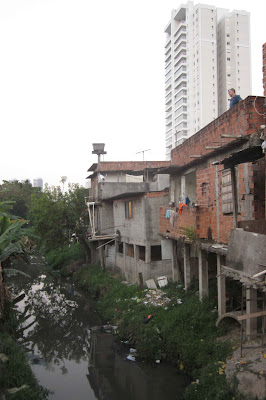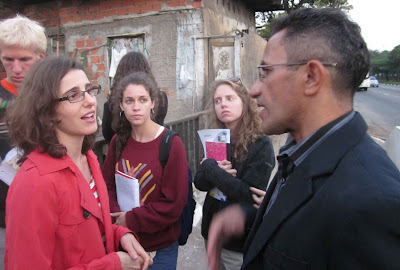Implementing the Right to the City in Brazil?
 |
| Comunidade Campo Grande Jurubatuba, an informal settlement in Santo Amaro subprefecture, São Paulo. Magic Condominium Resort tower in the background. |
The right to the city is a concept employed by a variety of actors at different scales, with its use ranging from being nestled within the status quo to staunchly anti-capitalist. Although present in many declarations and charters, the one place where binding legislation on the right to the city actually exists – along with inevitable, significant tensions inherent in its implementation – is Brazil.
Thanks to decades of struggle by an alliance of social housing movements, professionals, squatters, NGOs and academics, legislation ensuring the right to the city has been enshrined in the 2001 City Statute, a development law regulating the chapter on urban policy, specifically articles 182 and 183, in Brazil's 1988 Constitution. The City Statute defines the general guidelines that must be observed by federal, state and local governments to ensure democratic city management and the recognition of the "social function" of urban property and the city. "Social function" refers to the prioritization of use value over exchange value, that is collective interest over individual ownership rights, while democratic city management involves a path to plan, produce, operate and govern cities subject to social control and participation of civil society. It thus seeks to establish a new social ethic, condemning the city as a source of profits for a few in exchange for poverty for the many, and is institutionalized through various tools and forums, for example the mandatory public participation in Master Planning processes in cities and the creation of the Ministry of Cities and the National Council of Cities, to name a few.
| Comunidade Campo Grande Jurubatuba next to Magic Condominium Resort. |
 |
| Meeting and tour with Sr. Luiz, President of the Comunidade Campo Grande Jurubatuba Association (right) and Julia Moretti, lawyer with the Escritório Modelo |
One key challenge facing settlements wishing to claim their right to the city through the City Statute legislation is a more conservative São Paulo city government, whose interests are illustrated in the cartoon above where Mayor Kessab is driving a bulldozer reading "Project Sanitize" running over people claiming "we want housing", backed up by private interests stating "we want real estate speculation". The Mayor selects the heads of the 19 subprefectures of the city of São Paulo, almost all of whom are former military generals, people who are put in place largely because they know how to take orders. Many areas designated as Special Zones of Social Interest (ZEIS) in previous Master Plans – low income areas targeted for state intervention to create low-income housing, to protect them from real estate speculation – are now being re-classified as areas for development with no public consultation. These dynamics, as illustrated in the cartoon above, are being further magnified by 2014 World Cup development pressure.

Credits: Photographs from Melissa García Lamarca. Cartoon from a 'Favelas in Action' protest flyer.

